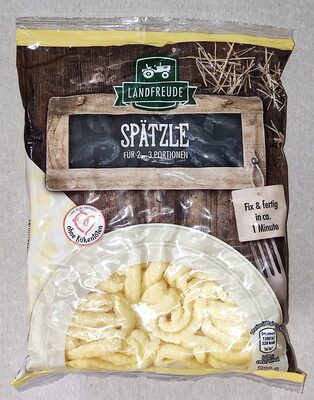
Barcode: 4061458018784
Spätzle
HALAL
📝 Reason: All ingredients listed are either plant-based or generally accepted as Halal without any Haram or Doubtful components. The product does not contain any meat or meat derivatives, and there are no Haram E-codes present in the ingredients list.
📄 Certificates: None
Ingredients:
Details
Is Spätzle Halal? Let’s Find Out!
When it comes to dietary choices, it’s essential to understand the Halal status of the food we consume. Spätzle, a traditional German noodle dish, is beloved for its texture and versatility in various dishes. But is Spätzle Halal? In this article, we’ll explore its ingredients, their Halal status, and the reasoning behind it.
Understanding Spätzle’s Ingredients
Spätzle consists of the following ingredients: Weizenmehl (wheat flour), Wasser (water), Vollei (whole egg), Speisesalz (table salt), Rapsöl (rapeseed oil), Säuerungsmittel (acidulant), and Kurkuma (turmeric). According to Halal dietary guidelines, let’s analyze each ingredient to clarify its Halal status:
- Weizenmehl (Wheat Flour): This is a staple ingredient in many recipes and is generally considered Halal. It does not contain any animal by-products, making it a safe choice for those following Halal diets.
- Wasser (Water): Water is a basic necessity in cooking and is universally regarded as Halal. There are no concerns about its Halal status.
- Vollei (Whole Egg): Whole eggs are considered Halal as they come from chickens and do not contain any Haram components.
- Speisesalz (Table Salt): Another universally regarded ingredient, table salt is Halal and poses no risk to dietary restrictions.
- Rapsöl (Rapeseed Oil): A plant-based oil, rapeseed oil is Halal. It serves as a healthy fat in many dishes, making it acceptable for those observing Halal guidelines.
- Säuerungsmittel (Acidulant): While acidulants are generally considered Halal, it’s crucial to ensure they are not derived from Haram sources. In the case of Spätzle, no specific source is mentioned, but the typical context suggests Halal origins.
- Kurkuma (Turmeric): This vibrant spice is derived from a plant and is widely accepted as Halal. It adds not only flavor but also color to the dish.
Conclusion: Spätzle’s Halal Status
After reviewing all the ingredients, we can confidently conclude that Spätzle is Halal. Each component is either plant-based or an ingredient that is generally accepted as Halal without any meat or meat derivatives. Importantly, there are no Haram E-codes within the listed ingredients, which further solidifies its status.
Final Thoughts
Spätzle is a delightful addition to various meals, and knowing its Halal status can make it more enjoyable for those observing Halal dietary laws. It’s crucial to remember that while the product itself is Halal, one should always check for specific certifications if available, although in this case, Spätzle does not carry additional Halal certification.
For those looking for hearty, Halal-compliant meals, incorporating Spätzle into your cooking repertoire can be both fulfilling and delicious.
